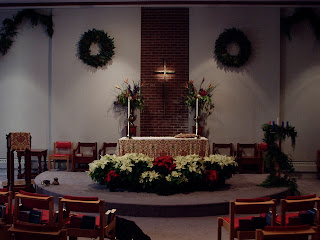 Psalms 50, (59) * 60 or 33; Isaiah 9:18-10:4; 2Peter 2:10b-16; Matthew 3:1-12
Psalms 50, (59) * 60 or 33; Isaiah 9:18-10:4; 2Peter 2:10b-16; Matthew 3:1-12
When things happen in life and dreams die, life becomes more challenging. Keeping faith and in conversation with God can be even more challenging.
People have different reactions when things begin to go sour. Some people get mad, some people fall into a depressed state that they have a hard time pulling themselves out of, some people act out, transposing those feelings of anger, annoyance, disappointment and sadness onto someone or something else. Some people pray harder for insight and grace and strength to bear what must be borne and find a path forward. We are all human and it is natural to have a mixture of different feelings and reactions when life takes a turn causing the stress of unexpected and unwanted change.
I tend to flow through all the various emotions one can have when things fall apart, but I do so (in not the healthiest of manners) by becoming quiet. My family and my close friends know this about me. People who don't know me all that well, most times, don't even notice that I am quieter than usual. It takes me some time to work my way through to get to a place of understanding and acceptance, all the time "functioning" in the world as best as I can. It is not really functioning well because a large part of my being is preoccupied with sorting through the emotions roiling on the inside. My prayer life is impacted as well: concentration, centering, reflection, all suffer. Those prayers do not stop though.
There is no set time for me when I come up for air, so to speak. So far in life, I always have. Although my prayer life suffers when dreams die and life-changes cause heartache, my prayer life also helps me through those darker times. I am reminded of this by today's Gospel reading in an odd way. Today we have John the Baptist's appearance in the Gospel of Matthew: a rather fire-breathing John at that. So much of our Gospel accounts revolve around the concept of surprise: God acting in surprising ways in the world, chief among them being Jesus. Jesus wasn't the conquering, warrior-like messiah that most people expected. He was something completed different. The dreams of many folks were dashed when that messiah image was altered by Jesus' appearance in the world.
This last thought helps me in those times when dreams die: the surprise that is Jesus Christ. It is not a magical panacea that takes away all hurt, anger, frustration, disappointment or sadness. But it is a lifeline nonetheless. A very important lifeline.
jfd+
Copyright 2008, John F. Dwyer. All Rights Reserved.
 MP: Psalms 46, 48; Isaiah 26:1-9; 2 Cor 5:16-6:2; John 8:12-19
MP: Psalms 46, 48; Isaiah 26:1-9; 2 Cor 5:16-6:2; John 8:12-19


















